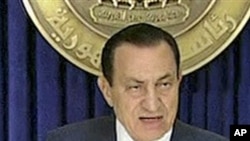Egyptian President Hosni Mubarak, who has ruled Egypt for nearly three decades, says he will not run for reelection in September. The announcement late Tuesday drew mixed reactions from demonstrators who mounted an unprecedented uprising that started a week ago.
|
Key Players in Egypt's Crisis
|
|
Listen to VOA's interview with demonstrator Tarek Hefny, who spoke from Cairo's Tahrir Square Recorded before President Mubarak's speech |
The announcement by President Hosni Mubarak followed a week of protests that culminated in a massive rally on Tuesday that drew hundreds of thousands of anti-government demonstrators to Cairo's Tahrir's Square.
Mr. Mubarak appeared on live television late Tuesday, saying he does not intend to renominate himself in the presidential election because, he said, his first responsibility is to ensure the stability of the nation and to preserve its integrity.
Demonstrations broke out a week ago. Scores of protesters were killed in clashes with police and hundreds were injured.
Cheers broke out on Tuesday night when demonstrators in and around Tahrir Square heard Mr. Mubarak's announcement. However, while some celebrated, others expressed anger and disappointment. Some opposition leaders said Mr. Mubarak's plans do not go far enough. Elections are not for another seven months and they want him to step aside now, not later.
A large crowd of demonstrators remained on the square past the curfew, some saying they will not move until Mr. Mubarak not only steps down, but also leaves the country no later than Friday.
The Army took up positions as it has done for the past several days. Protesters appear to have gained confidence after Army officials said they consider the demonstrations legitimate and promised that the Army would not fire on the protesters as long as they remain peaceful.
One big question is what kind state will emerge when Mr. Mubarak leaves office as promised. Already, there are disagreements within the opposition over whether Egypt should make democratic reforms or eventually become an Islamist state.
Supporters of President Mubarak interviewed on the streets of Cairo called for him to stay in office. Hundreds gathered in support of Mr. Mubarak at a separate rally and at a march early Wednesday.
Related video by Luis Ramirez














